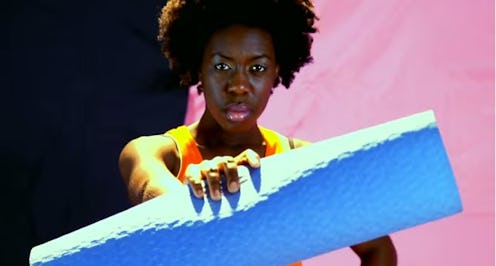Life
On Being the Only Black Girl in Yoga Class

Have you ever attended a yoga class and had that prickling feeling on the back of your neck? That feeling that, while you’re just trying to practice self-care, one of the many white women in your class has zeroed in on your presence and is already mentally drafting her "It Happened to Me" essay about you? While you may not personally relate, I can tell you that being one of the few people of color in a yoga class can make you feel self-conscious. It’s that self-consciousness that inspired Obehi Janice's “Black Girl Yoga” video. “It’s not complete discomfort, it’s a hyperawareness about your color,” Janice tells Bustle.
Janice was seeking to manage her depression when she first started taking yoga classes. During one of her first classes, she wore a satin scarf around her hair to protect it from the dirt on the mat and her instructor asked her if she was Muslim. “I don’t think that would happen to somebody who wasn’t black,” Janice says.
Moments like those, along with the prior knowledge that she would probably only see one other person of color, added to Janice’s self-consciousness in her yoga classes. The hyperawareness she referred to is telling, not just about segregation and privilege in Boston, where Janice lives, but also about health across the nation. From organic food to yoga classes to depression to breast cancer, black women and other people of color are often excluded from conversations about health.
”All these health things, in terms of representation, are white or upper class things,” Janice says “Even the whole yoga thing becomes coded with the white girl tag.”
In segregated Boston, she says yoga serves as a bit of a status symbol. "The yoga mat, the Lululemon yoga pants carry around a certain weight. Carrying that around means you can afford yoga classes,” she added. “Yoga in Boston is a richer, white woman, thing.”
She later stopped attending yoga classes (“I don’t really like yoga, I realized”) and took up bike riding instead. But even with that, Janice said it’s uncommon for her to see another POC on a bike around the city.
For Janice, "Black Girl Yoga" doesn't have a clear message — it simply draws from her experiences and observations from trying yoga in Boston. However, it has started conversations about what it's like to be the only POC in a yoga class and what that means for cultural and national discussions about health. “It’s a good conversation to have,” Janice says.
Images: Obehi Janice